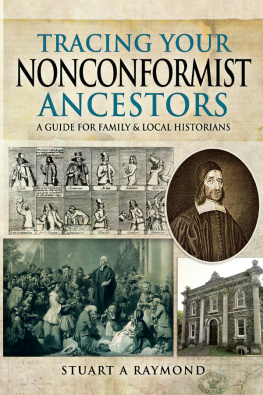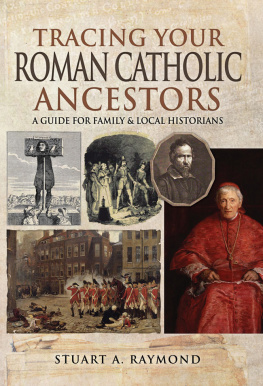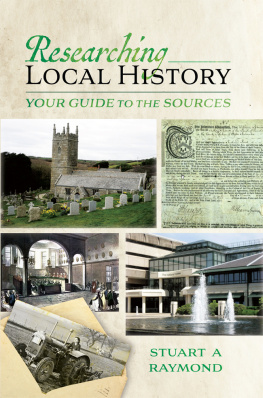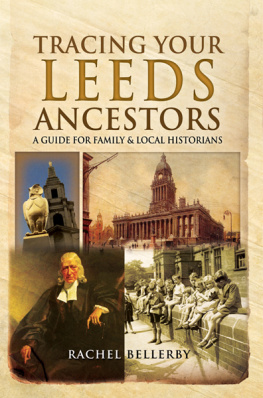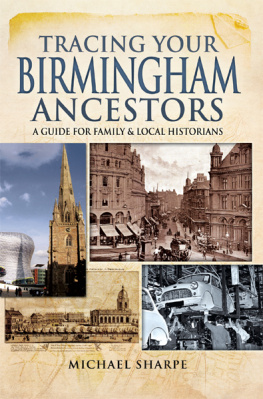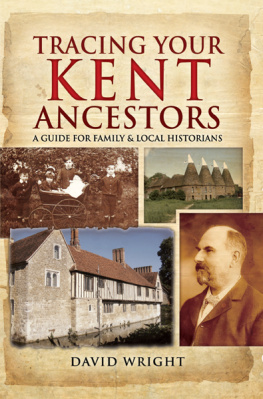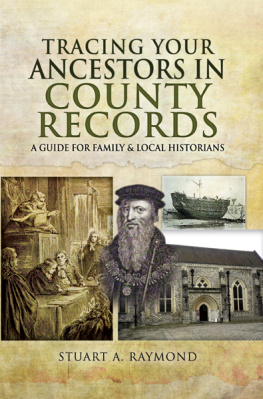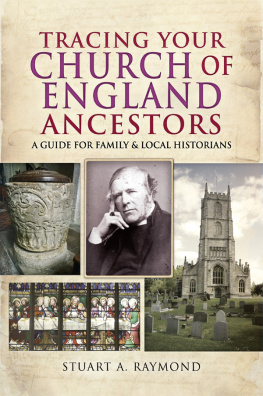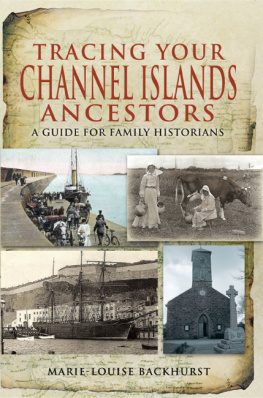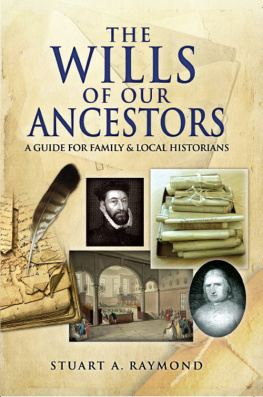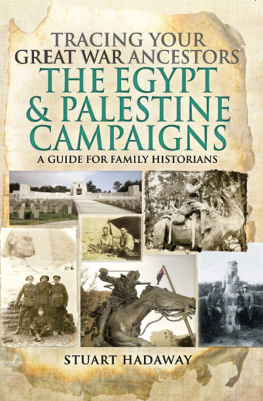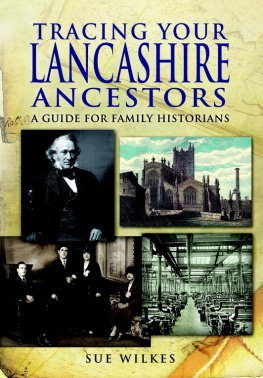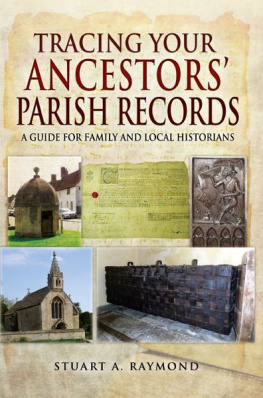
TRACING YOUR NONCONFORMIST ANCESTORS
FAMILY HISTORY FROM PEN & SWORD
Tracing Secret Service Ancestors
Tracing Your Air Force Ancestors
Tracing Your Ancestors
Tracing Your Ancestors from 1066 to 1837
Tracing Your Ancestors Through Death Records
Tracing Your Ancestors Through Family Photographs
Tracing Your Ancestors Using the Census
Tracing Your Ancestors Childhood
Tracing Your Ancestors in County Records
Tracing Your Ancestors Parish Records
Tracing Your Aristocratic Ancestors
Tracing Your Army Ancestors 2nd Edition
Tracing Your Birmingham Ancestors
Tracing Your Black Country Ancestors
Tracing Your British Indian Ancestors
Tracing Your Canal Ancestors
Tracing Your Channel Islands Ancestors
Tracing Your Coalmining Ancestors
Tracing Your Criminal Ancestors
Tracing Your East Anglian Ancestors
Tracing Your East End Ancestors
Tracing Your Edinburgh Ancestors
Tracing Your First World War Ancestors
Tracing Your Great War Ancestors: The Gallipoli Campaign
Tracing Your Great War Ancestors: The Somme
Tracing Your Great War Ancestors: Ypres
Tracing Your Huguenot Ancestors
Tracing Your Jewish Ancestors
Tracing Your Labour Movement Ancestors
Tracing Your Lancashire Ancestors
Tracing Your Leeds Ancestors
Tracing Your Legal Ancestors
Tracing Your Liverpool Ancestors
Tracing Your London Ancestors
Tracing Your Medical Ancestors
Tracing Your Merchant Navy Ancestors
Tracing Your Naval Ancestors
Tracing Your Northern Ancestors
Tracing Your Pauper Ancestors
Tracing Your Police Ancestors
Tracing Your Prisoner of War Ancestors: The First World War
Tracing Your Railway Ancestors
Tracing Your Royal Marine Ancestors
Tracing Your Rural Ancestors
Tracing Your Scottish Ancestors
Tracing Your Second World War Ancestors
Tracing Your Servant Ancestors
Tracing Your Service Women Ancestors
Tracing Your Shipbuilding Ancestors
Tracing Your Tank Ancestors
Tracing Your Textile Ancestors
Tracing Your Trade and Craftsmen Ancestors
Tracing Your Welsh Ancestors
Tracing Your West Country Ancestors
Tracing Your Yorkshire Ancestors
Wills of our Ancestors
TRACING YOUR NONCONFORMIST ANCESTORS
A Guide for Family and Local Historians
Stuart A. Raymond
First published in Great Britain in 2017
PEN & SWORD FAMILY HISTORY
an imprint of
Pen & Sword Books Ltd
47 Church Street,
Barnsley South Yorkshire, S70 2AS
Copyright Stuart A. Raymond, 2017
ISBN 978 1 47388 345 1
eISBN 978 1 47388 347 5
Mobi ISBN 978 1 47388 346 8
The right of Stuart A. Raymond to be identified as Author of the Work has been asserted by him in accordance with the Copyright, Designs and Patents Act 1988.
A CIP catalogue record for this book is available from the British Library.
All rights reserved. No part of this book may be reproduced or transmitted in any form or by any means, electronic or mechanical including photocopying, recording or by any information storage and retrieval system, without permission from the Publisher in writing.
Pen & Sword Books Ltd incorporates the imprints of Pen & Sword Archaeology, Atlas, Aviation, Battleground, Discovery, Family History, History, Maritime, Military, Naval, Politics, Railways, Select, Social History, Transport, True Crime, Claymore Press, Frontline Books, Leo Cooper, Praetorian Press, Remember When, Seaforth Publishing and Wharncliffe.
For a complete list of Pen & Sword titles please contact
PEN & SWORD BOOKS LTD
47 Church Street, Barnsley, South Yorkshire, S70 2AS, England
E-mail:
Website: www.pen-and-sword.co.uk
ABBREVIATIONS
| BMS | Baptist Missionary Society |
| IGI | International Genealogical Index |
| LDS | Latter Day Saints (Mormons) |
| MARC | Methodist Archives and Research Centre |
| SOAS | School of Oriental and African Studies |
| SoG | Society of Genealogists |
INTRODUCTION AND ACKNOWLEDGEMENTS
The aim of this book is to introduce family and local historians to the archives of the historic Nonconformist denominations of England and Wales. It covers all of the major denominations and also includes mention of many minor denominations, such as the Christadelphians and the Muggletonians. It does not, however, deal with the numerous new denominations established in the late twentieth century, although some sources relevant to that period are mentioned.
Many website addresses (URLs) are mentioned in the following pages. However, URLs change frequently. In order to identify any websites whose URLs have changed, simply search the title of the website at www.google.com . Alternatively, you may be able to find a copy of the original webpage by searching the old URL at the Wayback Machine https://archive.org .
This book has been in preparation for almost a decade. My thanks to Roger Thorne, who greatly encouraged me when I first began writing, gave me access to his library and read an early draft. One of my former students also read an early draft and made many useful suggestions.
Chapter 1
THE HISTORY OF NONCONFORMITY
Jesus prayed for his followers that they may all be one. Sadly, His prayer has frequently been ignored. The church has been divided since the clash between Peter and Paul mentioned in the Acts of the Apostles. Ever since that clash, both the doctrine and the practice of Christianity have been much disputed, and the fact that the Christian God is a God of love has frequently been lost sight of in bitter disputes that should have been judged in the light of that love.
In England, tradition assigns the foundation of the church to Aristobulus in the first century, although adequate evidence is lacking. Disputes wracked the Celtic church. In the late fourth century, Pelagius, who was born in Britain, denied the doctrine of original sin, caused major controversy and was denounced as a heretic. Several centuries later, when missionaries from Rome arrived in Canterbury, they found that the practices of Roman and Celtic traditions differed considerably and much bitterness was caused by a dispute over the date of Easter. By the end of the seventh century, however, the two traditions had fused and England enjoyed a remarkably long period without any serious division within the church.
That period ended at the end of the fourteenth century, with the rise of the Lollard heresy. The Lollards took their inspiration from John Wycliffe. He emphasized the individuals right to interpret the Bible for himself, challenged the privileged status of the clergy and denounced the wealth and pomp surrounding the church and its services. He was also the first person since King Alfred to attempt a translation of the Bible into English.
The Lollards, with the Continental Anabaptists of the early sixteenth century, were the spiritual forebears of those who sought separation from the established church on theological grounds. They were the original exponents of non-liturgical worship silence, prophesyings and open prayer as was subsequently practised by the Quakers. It may be that some later separatist churches were directly descended from Lollard groups. Such churches were persecuted and therefore did not keep records, but the fact that the first General Baptist church was located in Coventry, which had been a strong Lollard area, is suggestive. However, there is much academic dispute as to whether particular Lollard congregations survived until the Reformation. Local historians are well placed to search for evidence which may demonstrate continuity.
Next page
